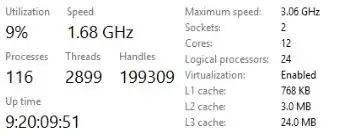After almost 6 years I'm approaching the 10 GB limit of my MS SQLExpress deployment. I'm looking at the licensing for MS-SQLServer and am getting more confused with everything I read. Can anyone help set the "Standard - server + CAL" vs "Standard - per core" licensing concepts straight in my head?
The application we use uses one user with about 12 sessions as per:
The Hardware has this profile:
So am I looking at one "Standard - server + CAL" for $1,000 based on the application usage or a "Standard - per core" based on the number of hardware cores? Or have I twisted my brain around this so much that I'm lost?

